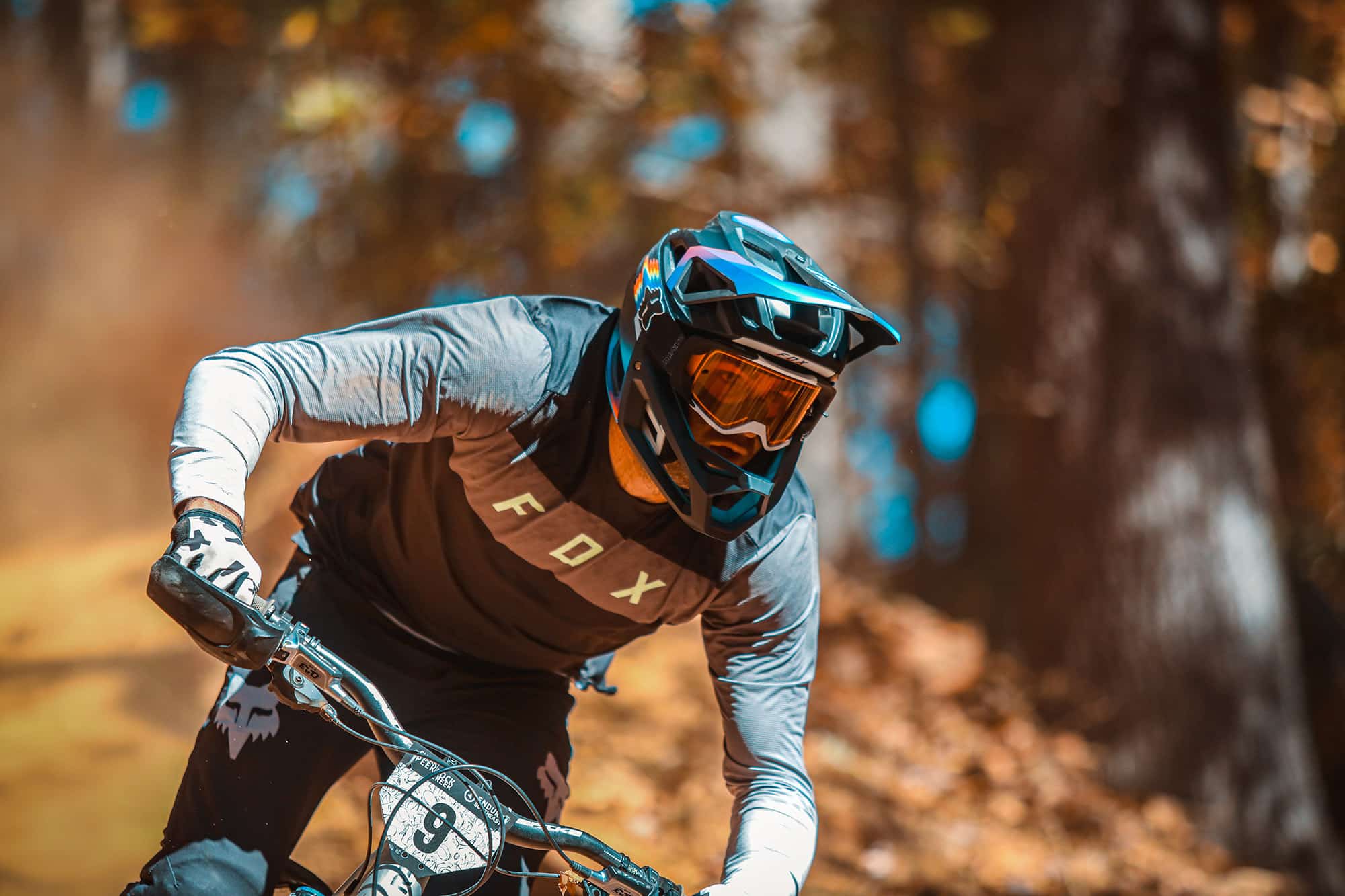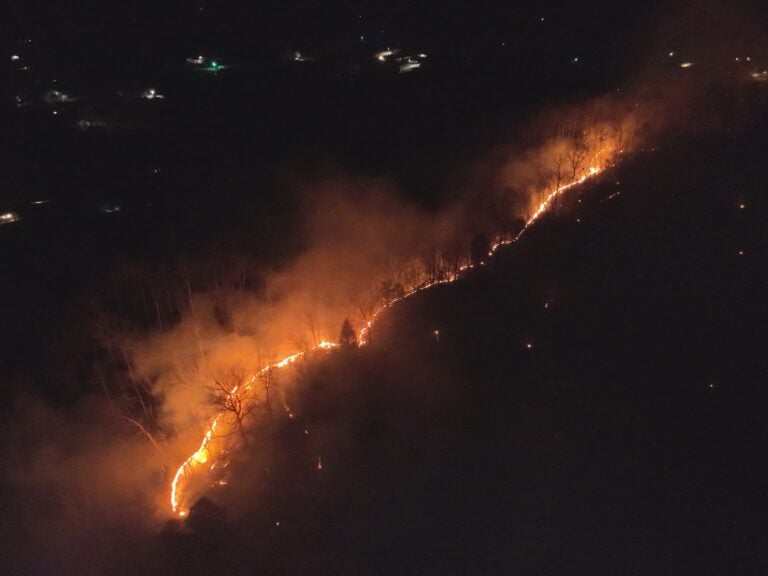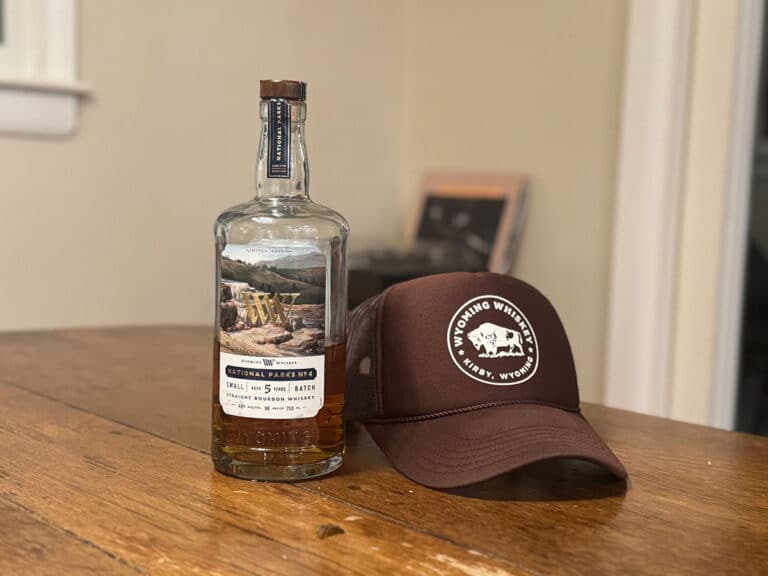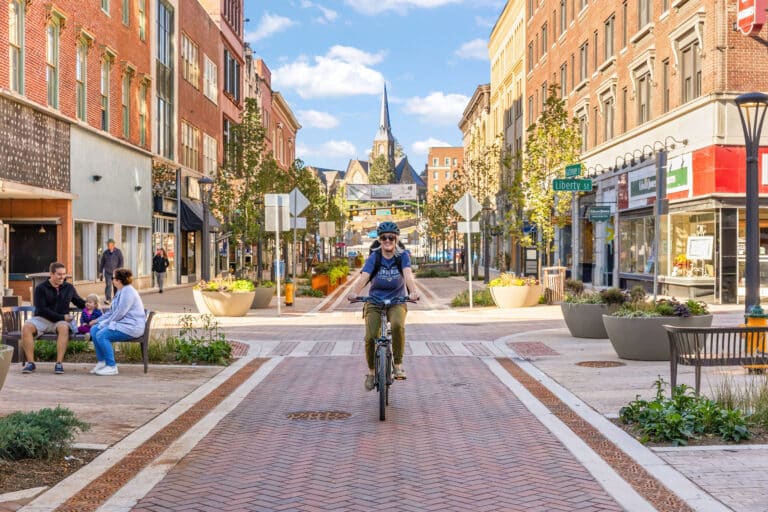Ride Rock Creek features seven downhill mountain bike trails for a variety of skill levels. All photos courtesy of Ride Rock Creek
Down the Mountain
Professional downhill mountain biker Neko Mulally, of Pisgah Forest, N.C., got his third international podium March 19 in New Zealand, up against some of the world’s best cyclists. He sped down the 1.2-mile course in 3:01, nabbing the third spot against cyclists he’s gone head-to-head with since going pro more than a decade ago.
But of the riders he faced in the elite field, there’s something different about Mulally: He’s the only one who built and runs his own bike park. And what’s more, he runs two.
Ride Rock Creek, in Zirconia, N.C., opened in December, and since then has shuttled 150 to 200 riders up the lift access road each weekend to bomb down Barkbuster, Tumbleweed, and the other trails built by in-house trail crew Pisgah Trails LLC.
Mulally started Rock Creek with Callie Horwath, a retired cross-country mountain biker and winning e-bike cyclist, and Dave Lamond, a sports medicine doctor and passionate cyclist himself. The trio, who also opened 225-acre Ride Kanuga in Hendersonville in 2020, had been gunning to open a lift access park for some time. Mulally opened Windrock Bike Park in Oliver Springs, Tenn., with pal Sean Leader in 2016, but handed full control of the park over to Leader in 2020 after getting burnt out on the frequent three-hour drives to work.
While nearby Pisgah National Forest is plenty rugged, a local lift access park would give him and fellow pros like Luca Shaw and Christopher Grice a place to train and make downhill a year-round reality in the Carolinas. The nearest lift access parks, two hours away in the high country, open from just Memorial Day to Labor Day.
Kanuga, which quickly grew in rapid popularity due to the pandemic outdoor boom, proved to the trio that a pay-to-play bike park was possible in western North Carolina, despite the bevy of free trails nearby.
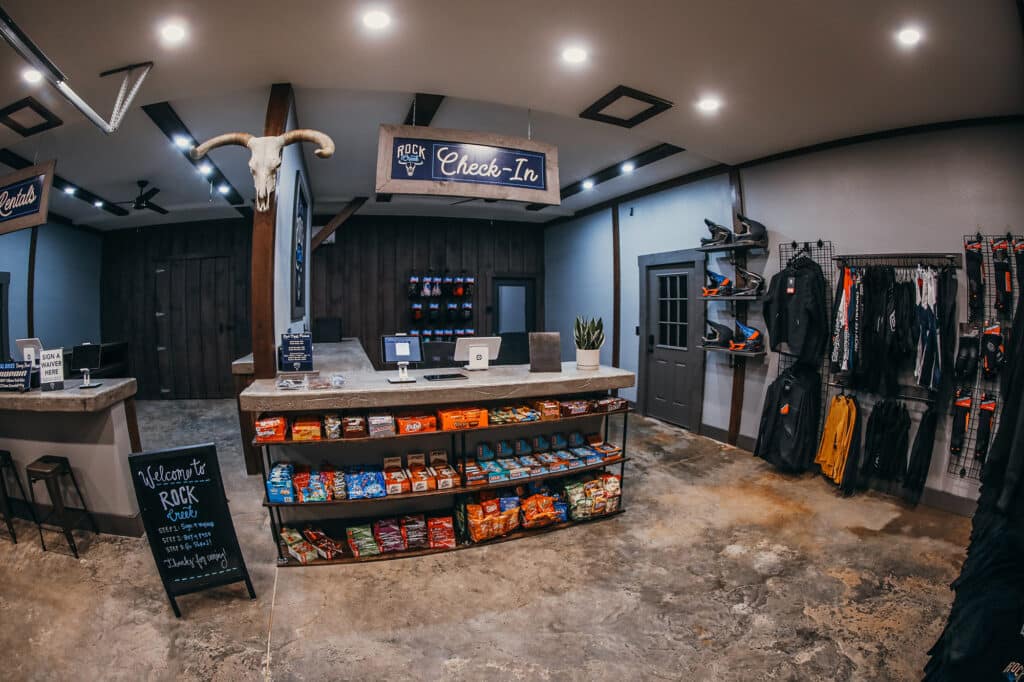
“When we first opened Kanuga, [people would ask] ‘why would I pay to go ride trails there?’ and then afterwards, the response from those people was, ‘wow, those were the best trails I’ve ridden in the area, and maybe some of the best that I’ve ever ridden.’ So I think that we’re past that now [for Rock Creek],” Lamond said. “People understand there’s a shuttle, there’s a place where you can get snacks, rent bikes, and get repairs done, and there’s a perception that it’s safer versus just being in the forest.”
The Mountain
Rock Creek opened in December with five top-to-bottom trails, a connector, and a jump line.
Green River, the lone green trail, was machine-built by Horwath. While it’s approachable for beginners, steep turns and tall berms give experienced riders the chance to carry real speed.
There’s variety in the blue trails Barkbuster, Tumbleweed, Strange Beast, and Big Baby.
Barkbuster is a singletrack rake-and-ride, affectionately called both “turn track” and “rut track” by riders for its flat corners and already well-seasoned ruts. Riders can take it to the bottom or hop on Strange Beast, a tight off-camber trail, halfway through.
Tumbleweed, a machine built by trail builder Morgan Barkeley, is a fun rollercoaster of switchbacks and rollers featuring one of the mountain’s only natural rock gardens, and it spits you out onto Big Baby, a fast, swoopy jump line with roller options and a 20-foot step-down.
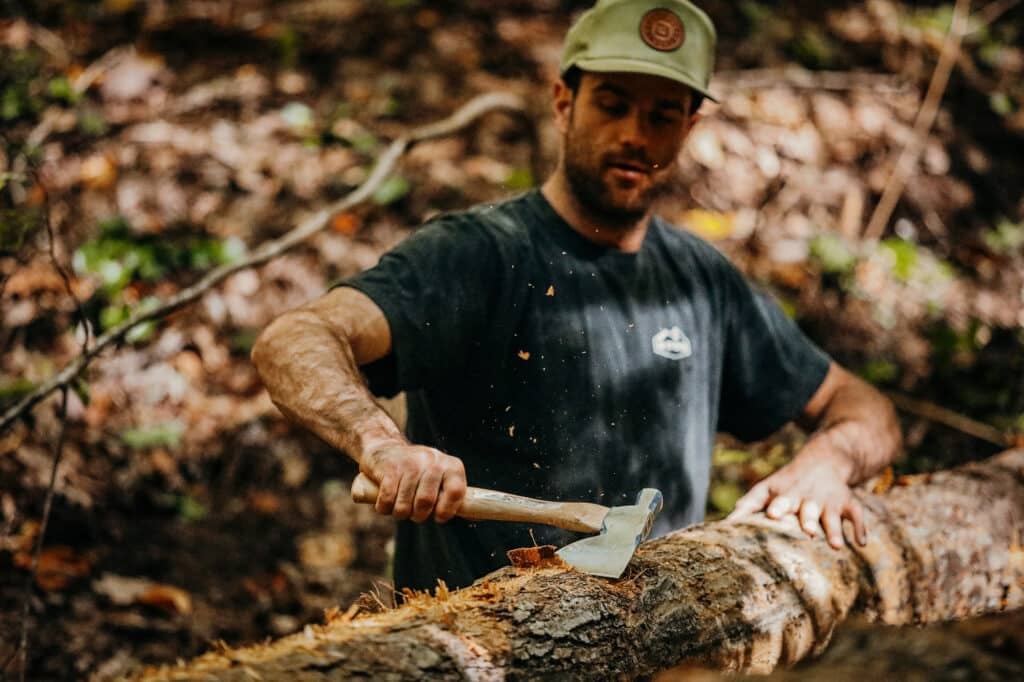
Dark Hollow, the single black trail, is a classic enduro track with some steep, fast sections and a rock garden through the rhododendrons.
And finally, Stampede, the double-black trail and downhill racetrack, is the only trail at the park where downhill bikes are nearly non-negotiable, with big drops and gnarly rock gardens. Mulally built it in part as a testing lab for Frameworks, his custom bike company.
“It’s fun if you can be on top of it. But if you struggle with features at all, it’s really not fun,” Mulally said. “It’s like the slower you go, the worse it is.”
The pièce de resistance, though, is the lift access road—paved up to a certain point, then gravel beyond that—which takes riders and their bikes straight up the mountain in school buses. The five-minute shuttle up leaves no one questioning the value of lift access: with 700 feet of vertical, it’s a would-be ass-kicker. Without having to bike it, riders can get upwards of 20 runs a day.
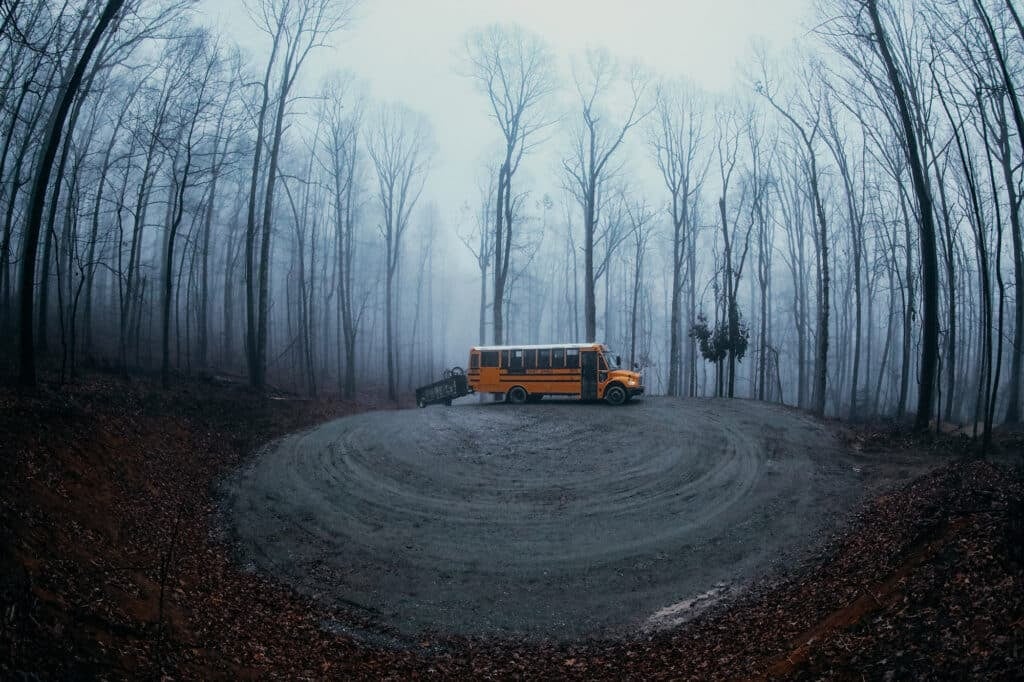
Rock Creek’s inaugural trails are south-facing, so they dry out well after storms and aren’t subject to much freeze-thaw in the winter. What was peanut butter opening weekend amid four days of rain was hero dirt by weekend two. It’s the type of grippy, fun-to-ride dirt that brings out the best in every rider.
There’s already plenty of variety for different skill levels and more trails will be open by summer. While Horwath said Rock Creek has thus far attracted more core riders (compared to Kanuga, which has a beginner-friendly vibe), Lamond highlighted the park’s accessibility.
Horwath is a mean digger operator, but she also gets much of the credit for how accessible both bike parks are before riders’ wheels even hit the trail.
“Callie has really good attention to detail. Everything in the shops at both parks, how things are around the parking lot, the maps—those things add up to the total experience, and from a business perspective, they’re really valuable and they give a really good impression of the bike park,” Mulally said. “Sometimes those little details get lost on me and Dave, but Callie is very particular about that stuff. I think we’re a good team.”
Championship Venue
Just four months after opening, Rock Creek landed on USA Cycling’s shortlist to host this year’s Gravity Mountain Bike National Championships.
From July 12 to 16, the park will host national downhill, enduro, and dual slalom races, and in doing so will accomplish one of the objectives they had in building Rock Creek in the first place. The event will remain at Rock Creek for 2024.
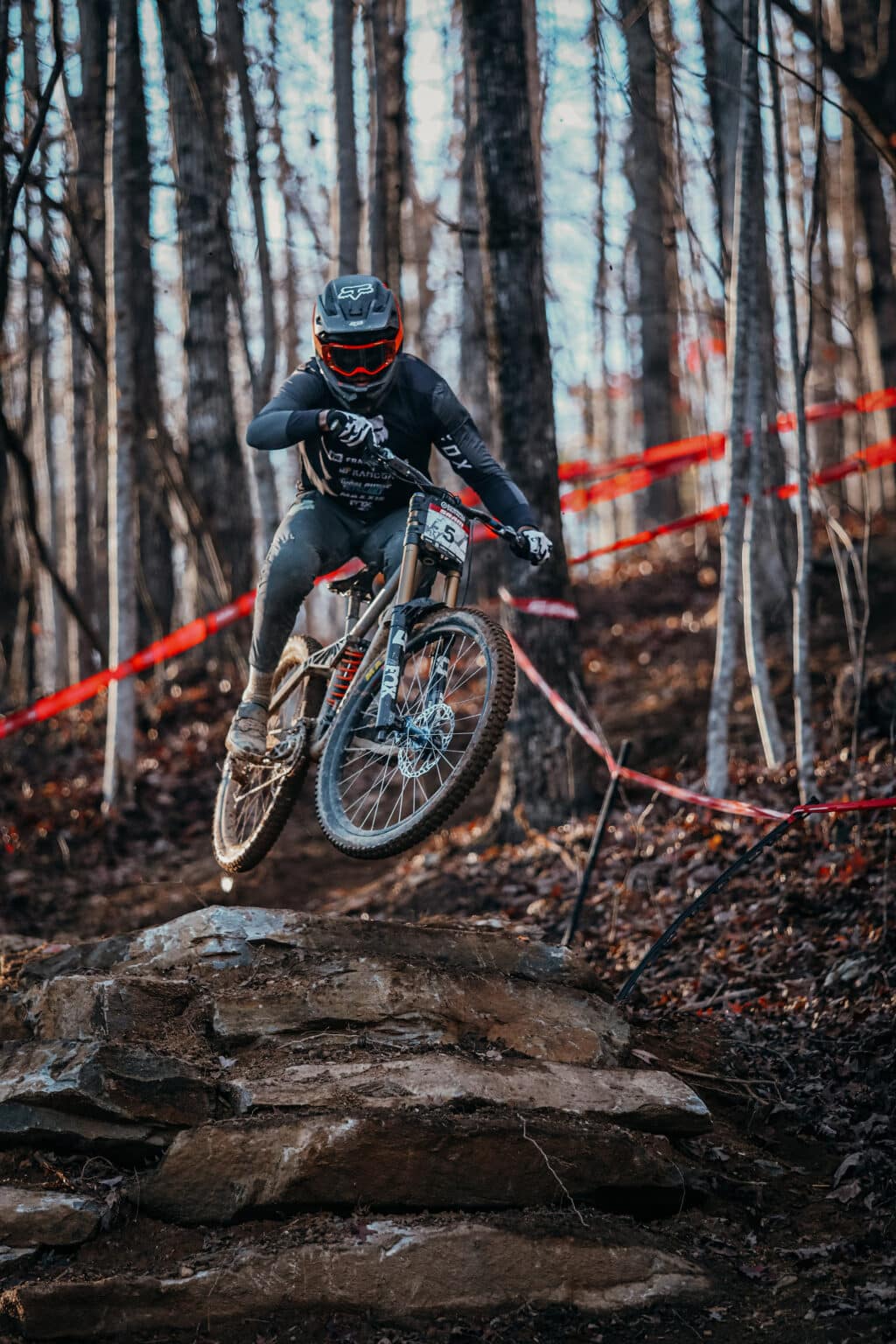
“We need an economic impact study on Neko,” said one cheeky commenter to USA Cycling’s Instagram announcement.
“We are eager to see the development and growing community at Rock Creek and know this will be a great new addition to our National Championship venues with newly built dual slalom course and enduro stages,” said USA Cycling Director of National Events Tara McCarthy.
The community is, indeed, growing. Riders feel it as soon as they hop on the shuttle, which Friday through Sunday is abuzz with chatter and excitement about trail preference and line choice. Go two weekends in a row and you’ll no doubt see familiar faces. Take a break around the fire pit near the shop and reconnect with friends from the hill.
In April, Rock Creek hosted the year’s second of seven events for Downhill Southeast, the race series Mulally started in 2016 with his mom and brother to fill a void of preseason practice races. It’s since grown into one of the country’s most active regional downhill series, with 300 average entrants per race.
“The whole long-term objective of Rock Creek was to become a national event center, and we want to build upon that. Obviously, this is a big deal,” Lamond said of the upcoming National Championships. “There’s other national series that we’d love to host over time, and [we’ll focus on] creating an atmosphere that becomes a destination for that. Beyond that, the goal is also to make it approachable to different groups of riders and making a pretty special place that people come for that experience.”
